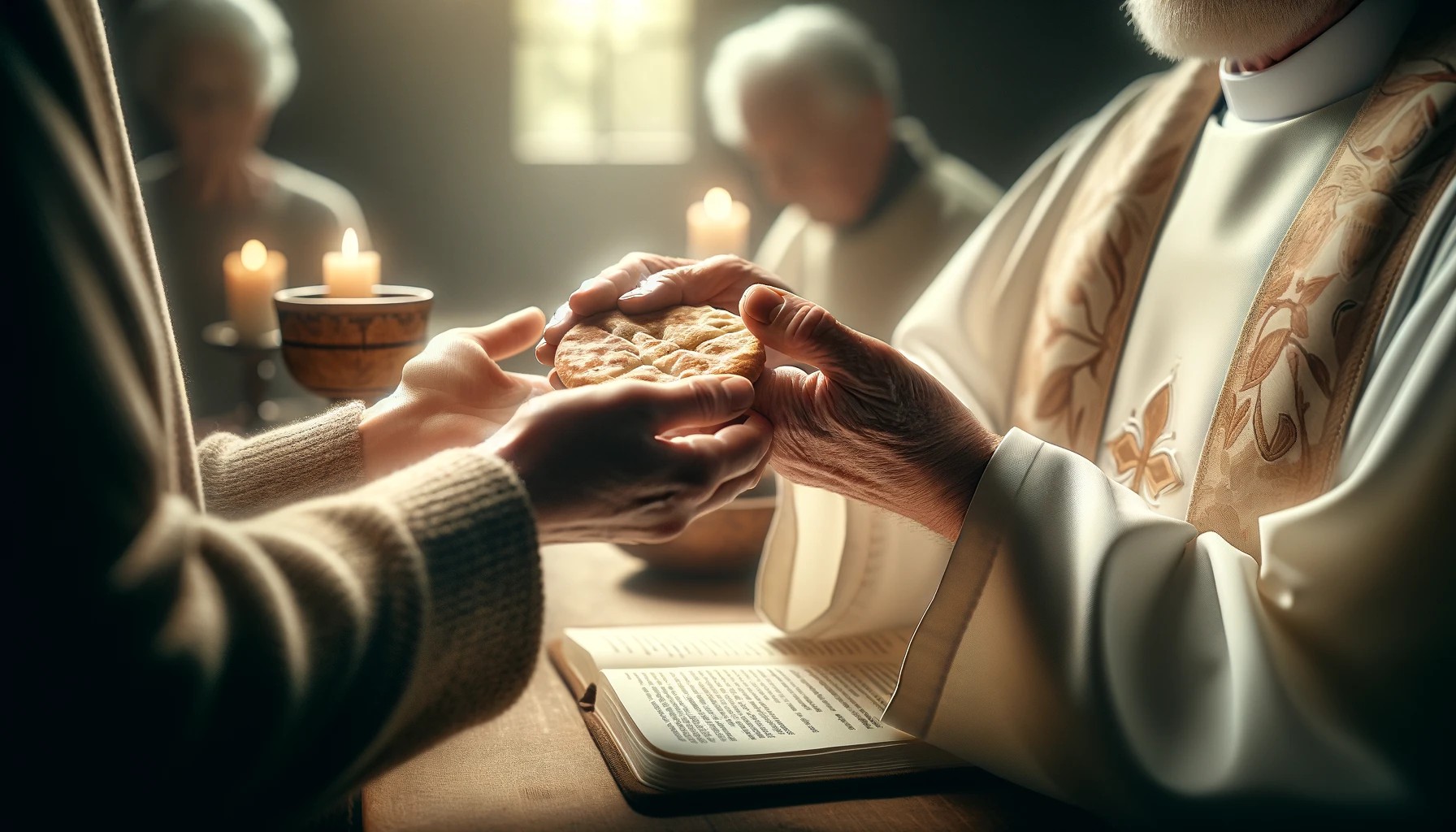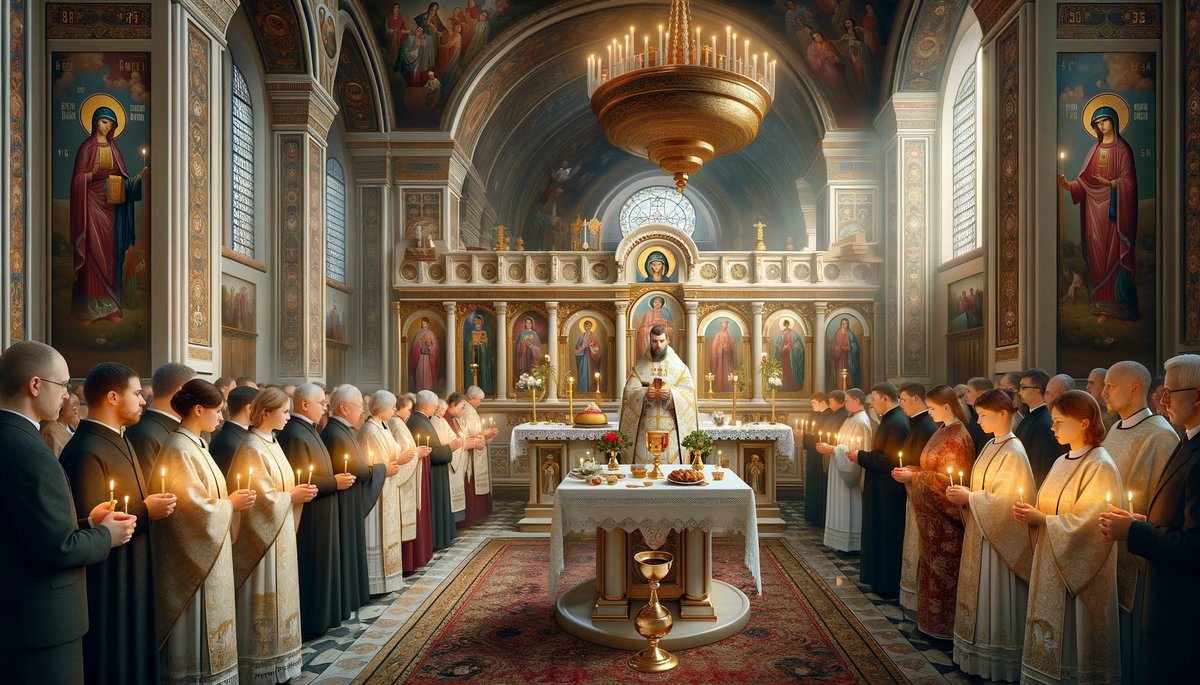Home>Theology and Spirituality>Why Take Communion Every Sunday


Theology and Spirituality
Why Take Communion Every Sunday
Published: February 19, 2024
Jason DeRose, Managing Editor at Christian.net, uses his expertise in religion and journalism to deepen understanding of faith's societal impacts. His editorial leadership, coupled with a strong academic background, enriches the platform’s diverse content, earning him recognition in both journalism and religious circles.
Discover the significance of taking communion every Sunday and its impact on theology and spirituality. Explore the reasons behind this sacred practice.
(Many of the links in this article redirect to a specific reviewed product. Your purchase of these products through affiliate links helps to generate commission for Christian.net, at no extra cost. Learn more)
Table of Contents
Introduction
The act of taking communion, also known as the Lord's Supper or Eucharist, holds profound significance in the Christian faith. It is a sacred ritual that symbolizes the body and blood of Jesus Christ, and it serves as a powerful reminder of His sacrificial love and the redemptive power of His sacrifice on the cross. The practice of communion has been a cornerstone of Christian worship for centuries, and its observance varies among different denominations and traditions.
In this article, we will explore the theological and spiritual aspects of communion, delving into its biblical foundation, the profound importance of remembering Christ's sacrifice, the spiritual nourishment it provides, the unity and fellowship it fosters among believers, and the continual renewal of commitment to Christ that it signifies. By examining these facets, we will gain a deeper understanding of why taking communion every Sunday is not only a tradition but also a spiritually enriching and transformative practice for Christians around the world.
The Biblical Basis for Communion
The biblical foundation for communion is rooted in the accounts of the Last Supper, a pivotal event in the life of Jesus Christ. In the New Testament, the Gospels of Matthew, Mark, and Luke, as well as the apostle Paul's first letter to the Corinthians, provide detailed narratives of this significant occasion. During the Last Supper, Jesus shared a meal with His disciples, and it was during this intimate gathering that He instituted the practice of communion.
In the Gospel of Luke, chapter 22, verses 19-20, Jesus takes bread, gives thanks, breaks it, and gives it to His disciples, saying, "This is my body given for you; do this in remembrance of me." He then takes the cup, gives thanks, and tells them, "This cup is the new covenant in my blood, which is poured out for you." These profound words underscore the spiritual significance of communion as a symbolic representation of Christ's sacrificial death and the establishment of a new covenant between God and humanity.
The apostle Paul further expounds on the meaning and purpose of communion in his first letter to the Corinthians. In 1 Corinthians 11:23-26, he recounts the events of the Last Supper and emphasizes the solemnity and reverence with which the practice should be approached. He instructs the believers to partake in communion in a manner that reflects deep introspection, unity, and reverence for the sacrifice of Christ.
The biblical basis for communion, as elucidated in these passages, underscores its foundational importance in the Christian faith. It serves as a tangible and sacred expression of Christ's atoning sacrifice, the establishment of the new covenant, and the spiritual nourishment and unity of believers. By partaking in communion, Christians not only commemorate the historical event of the Last Supper but also enter into a profound spiritual communion with Christ and fellow believers, reaffirming their faith and devotion to the teachings of Jesus.
This biblical foundation provides a compelling rationale for the regular observance of communion within Christian worship, as it serves as a continual reminder of the central message of the gospel and the transformative power of Christ's redemptive work. As such, the biblical basis for communion forms the bedrock of its significance and enduring practice within the Christian tradition.
The Importance of Remembering Christ's Sacrifice
The act of remembering Christ's sacrifice holds profound significance in the life of a Christian. It serves as a poignant reminder of the immense love and selflessness demonstrated by Jesus through His sacrificial death on the cross. The commemoration of Christ's sacrifice is not merely a ritualistic practice but a deeply spiritual and transformative experience that allows believers to reflect on the foundational tenets of their faith.
At the heart of Christianity lies the belief in the redemptive power of Christ's sacrifice. The apostle Paul, in his letter to the Romans, succinctly captures the essence of this foundational truth by stating, "But God demonstrates his own love for us in this: While we were still sinners, Christ died for us" (Romans 5:8, NIV). This profound declaration encapsulates the essence of Christ's sacrifice as the ultimate expression of divine love and grace extended to humanity. Therefore, the act of remembering Christ's sacrifice through communion is a solemn acknowledgment of this incomparable act of love and redemption.
Moreover, the remembrance of Christ's sacrifice serves as a source of spiritual nourishment and sustenance for believers. In the Gospel of John, Jesus proclaims, "I am the bread of life. Whoever comes to me will never go hungry, and whoever believes in me will never be thirsty" (John 6:35, NIV). This metaphorical depiction underscores the spiritual nourishment that believers receive through their faith in Christ. When partaking in communion, the symbolic consumption of the bread and wine represents a spiritual feast wherein believers are reminded of the sustenance and fulfillment found in Christ alone.
Furthermore, the act of remembering Christ's sacrifice fosters a deep sense of gratitude and humility within the hearts of believers. It prompts introspection and self-examination, compelling individuals to confront their own shortcomings and the magnitude of Christ's redemptive act. This introspective reflection engenders a spirit of humility and gratitude, as believers acknowledge their dependence on the grace and mercy made available through Christ's sacrifice.
In essence, the importance of remembering Christ's sacrifice through communion transcends mere ritualistic observance. It serves as a profound spiritual practice that renews and strengthens the faith of believers, nourishes their souls, and cultivates a spirit of gratitude and humility. By partaking in this sacred act of remembrance, Christians reaffirm their commitment to the teachings of Jesus and the transformative power of His sacrificial love.
The Spiritual Nourishment of Communion
The act of partaking in communion holds profound spiritual significance for believers, offering a unique form of nourishment for the soul. At the core of communion lies the symbolic consumption of bread and wine, representing the body and blood of Christ. This act of partaking in the elements serves as a spiritual feast, providing nourishment and sustenance for the inner being of the believer.
In the Gospel of John, Jesus proclaims, "I am the bread of life. Whoever comes to me will never go hungry, and whoever believes in me will never be thirsty" (John 6:35, NIV). This metaphorical depiction underscores the spiritual nourishment that believers receive through their faith in Christ. When partaking in communion, the symbolic consumption of the bread and wine represents a spiritual feast wherein believers are reminded of the sustenance and fulfillment found in Christ alone.
The spiritual nourishment derived from communion transcends the physical act of consuming the elements; it encompasses a deep, soul-satisfying experience that rejuvenates and strengthens the innermost being of the believer. It serves as a reminder of the spiritual sustenance and fulfillment that Christ provides, nourishing the soul and imparting a profound sense of peace and contentment.
Furthermore, communion serves as a spiritual sustenance that fortifies believers in their faith journey. It offers a moment of intimate communion with Christ, allowing individuals to draw near to Him and experience His presence in a tangible and transformative manner. This spiritual communion fosters a deep sense of spiritual nourishment, rejuvenating the believer's faith and providing strength for the challenges and trials encountered in life.
The spiritual nourishment derived from communion extends beyond the individual experience, fostering a sense of unity and fellowship among believers. As the body of Christ partakes in the elements together, there is a communal sharing in the spiritual nourishment and sustenance that Christ provides. This shared experience of spiritual nourishment strengthens the bonds of fellowship and unity among believers, reinforcing the communal aspect of the Christian faith.
In essence, the spiritual nourishment of communion is a profound and transformative experience that transcends the physical realm, offering believers a spiritual feast that rejuvenates, strengthens, and unites the body of Christ. Through the act of partaking in communion, believers are reminded of the spiritual sustenance found in Christ alone, fostering a deep sense of spiritual nourishment and unity within the faith community.
The Unity and Fellowship of Communion
The act of partaking in communion transcends individual spiritual experiences; it fosters a profound sense of unity and fellowship within the body of Christ. As believers gather to partake in the elements of bread and wine, they enter into a communal expression of their shared faith and devotion to Christ. This communal act serves as a unifying force, binding believers together in a shared experience of spiritual nourishment and renewal.
Communion embodies the concept of unity in diversity, as individuals from varied backgrounds, cultures, and walks of life come together as one body to partake in this sacred ritual. The apostle Paul, in his first letter to the Corinthians, emphasizes the communal nature of communion, stating, "Because there is one bread, we who are many are one body, for we all partake of the one bread" (1 Corinthians 10:17, ESV). This profound declaration underscores the unifying aspect of communion, wherein believers, despite their diversity, are united as one body through their participation in the symbolic elements.
Furthermore, communion fosters a deep sense of fellowship among believers. It provides a sacred space for individuals to come together, share in the spiritual nourishment offered by Christ, and strengthen their bonds of fellowship. The act of partaking in communion signifies a shared commitment to the teachings of Jesus and a collective acknowledgment of His redemptive work. This shared experience of fellowship deepens the sense of community and mutual support within the body of Christ, fostering an environment of love, empathy, and shared spiritual journey.
Moreover, communion serves as a tangible expression of the unity that believers share in Christ. It transcends denominational differences and theological nuances, uniting all who profess faith in Jesus Christ as Lord and Savior. In partaking of the elements, believers affirm their common identity as members of the universal body of Christ, transcending individual affiliations to embrace a shared spiritual heritage and destiny.
The unity and fellowship experienced through communion extend beyond the confines of the physical gathering; they permeate the fabric of the Christian community, fostering a spirit of mutual care, compassion, and solidarity. This shared experience of communion serves as a unifying force that strengthens the bonds of fellowship and encourages believers to walk together in love and unity, reflecting the transformative power of Christ's love within the body of believers.
In essence, the unity and fellowship of communion exemplify the communal nature of the Christian faith, uniting believers in a shared experience of spiritual nourishment, renewal, and fellowship. As the body of Christ partakes in communion, it embodies the profound truth of being one in Christ, fostering a deep sense of unity and fellowship that transcends individual differences and unites believers in a shared journey of faith and devotion.
The Continual Renewal of Commitment to Christ
The act of partaking in communion represents a continual renewal of commitment to Christ within the life of a believer. It serves as a sacred and transformative practice through which individuals reaffirm their dedication to following the teachings of Jesus and embodying His love and grace in their daily lives.
Communion provides a poignant opportunity for believers to reflect on their relationship with Christ and renew their commitment to living in accordance with His principles. As they partake in the symbolic elements of bread and wine, believers engage in a profound act of spiritual renewal, expressing their ongoing devotion to Christ and His redemptive work.
The apostle Paul, in his first letter to the Corinthians, underscores the significance of this continual renewal, stating, "For as often as you eat this bread and drink the cup, you proclaim the Lord's death until he comes" (1 Corinthians 11:26, ESV). This declaration emphasizes the enduring nature of communion as a proclamation of Christ's sacrificial death and a continual reaffirmation of faith until His return.
Moreover, the act of partaking in communion serves as a tangible expression of repentance and reconciliation. It provides believers with a sacred moment to confess their shortcomings, seek forgiveness, and recommit themselves to a life guided by the principles of love, compassion, and righteousness exemplified by Christ. This continual renewal of commitment fosters a spirit of humility and contrition, allowing individuals to realign their hearts and minds with the transformative message of the gospel.
Furthermore, communion serves as a catalyst for spiritual growth and transformation. As believers engage in this sacred practice on a regular basis, they are reminded of the ongoing process of sanctification and renewal that occurs within the Christian journey. The act of partaking in communion symbolizes a continual striving towards spiritual maturity and a deepening of one's relationship with Christ, signifying an ongoing commitment to embodying His teachings in every aspect of life.
In essence, the continual renewal of commitment to Christ through communion is a profound and transformative practice that underscores the enduring nature of the Christian faith. As believers partake in this sacred ritual, they express their ongoing dedication to following Christ, seeking forgiveness, and embracing the transformative power of His redemptive love. This continual renewal serves as a cornerstone of the Christian walk, fostering a deep sense of spiritual growth, humility, and unwavering commitment to the teachings and example of Jesus Christ.
Conclusion: The Benefits of Taking Communion Every Sunday
The regular practice of taking communion every Sunday offers a myriad of profound benefits for believers within the Christian faith. This sacred ritual, rooted in the biblical foundation of Christ's sacrifice and the establishment of the new covenant, holds transformative power and spiritual significance that transcends the confines of mere tradition. By partaking in communion on a weekly basis, individuals experience a deep sense of spiritual nourishment, unity, and continual renewal of commitment to Christ.
One of the primary benefits of taking communion every Sunday is the opportunity for believers to engage in a regular and tangible expression of their faith. The act of partaking in the symbolic elements of bread and wine serves as a powerful reminder of Christ's sacrificial love and the redemptive work accomplished through His death and resurrection. This regular observance fosters a deep sense of spiritual nourishment, providing believers with a consistent source of renewal and sustenance for their faith journey.
Furthermore, the communal aspect of taking communion every Sunday fosters a profound sense of unity and fellowship within the body of Christ. As believers gather to partake in this sacred ritual, they engage in a shared experience of spiritual nourishment and renewal, strengthening the bonds of fellowship and mutual support within the faith community. This communal act serves as a unifying force, transcending individual differences and fostering a spirit of love, empathy, and shared spiritual journey among believers.
Additionally, the regular observance of communion every Sunday signifies a continual renewal of commitment to Christ. It provides believers with a sacred space to reflect on their relationship with Christ, seek forgiveness, and reaffirm their dedication to living in accordance with His teachings. This ongoing practice of spiritual renewal fosters a deep sense of humility, contrition, and unwavering commitment to embodying the transformative message of the gospel in every aspect of life.
In essence, the benefits of taking communion every Sunday are multifaceted, encompassing spiritual nourishment, unity, and continual renewal of commitment to Christ. This sacred practice serves as a cornerstone of the Christian faith, offering believers a consistent source of spiritual sustenance, fostering a deep sense of unity and fellowship, and providing a regular opportunity for ongoing spiritual growth and transformation. As such, the regular observance of communion every Sunday holds immeasurable significance in the lives of believers, enriching their faith journey and deepening their connection to the transformative message of the gospel.














